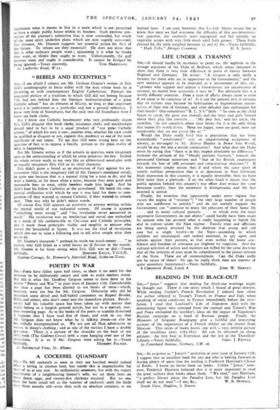LIFE UNDER A TYRANNY
SIR,—It should hardly be necessary to point om the sophism in the strange argument of the Duke of Bedford, which seems designed to show that there is very little difference in point of liberty between England and Germany. He writes: "A tyranny is only really a tyranny for those who are in opposition to the Government," and the next sentence appears to be intended as a restatement of this, viz., "persons who support and admire a Government are unconscious of tyranny, no matter how autocratic it may be." But obviously this is a totally different assertion. Does a state of affairs always cease to exist if we cease to be conscious of it? Is it not the greatest evil in tyranny that its victims may become by 'habituation or hypnotisation uncon- scious of their loss of freedom, and even deluded into enthusiasm for their bonds? One remembers "R. L. S's " fable: "So soon as the child began to speak, the gyve was riveted; and the boys and girls limped about their play like convicts. . . 'My dear boy,' said his uncle, the catechist, do not complain about your fetter, for it is the only thing that makes life worth living. None are happy, none are good, none are respectable, that are not gyved like us.'"
Would the Duke really hold that a population that has been scientifically " conditioned " Into an unquestioning acceptance of slavery, as envisaged by Mr. Aldous Huxley in Brave New World, would be any the less a servile community? And what does the Duke mean by saying that "there is in this respect absolutely no difference" between the attitude of the "blindly patriotic German" towards the persecuted German minorities and "that of his British counterpart towards the fate of 18B prisoners and conscientious objectors "? If this statement simply means that if and where the same spirit of utterly ruthless persecution that is so dominant in Nazi Germany finds expression in this country, it is. equally detestable, then we have little more than a platitude: if on the other hand it means that the public opinion behind this country's war effort does evince the same ferocious cruelty, then the statement is disingenuous and the fact asserted is untrue.
Finally, the assertion that (apparently under every regime that incurs the stigma of "tyranny ") "the very large number of people who are indifferent to politics" and do not actively support the Government can "continue to enjoy the pleasures of their home life . . . and in many cultural pursuits . . . to which .even the most oppressive Governments do not object," could hardly have been made by anyone who has grasped what is really happening to family life and to culture under the Nazi regime. Family trust and affection are being openly attacked by the doctrine that young and old owe but a single loyalty—to the State—according to which children are encouraged, and indeed enjoined, to spy upon and inform against their parents, so that even within the home con- fidence and freedom of utterance are blighted by suspicion. And the cultural activities of artists and students are stifled by the same doctrine that all the interests of man must be subordinated to the power-interest of the State. These are all commonplaces. Can the Duke really not be aware of them? Or can he really think they are matters of quite secondary importance?—Yours faithfully,






























 Previous page
Previous page